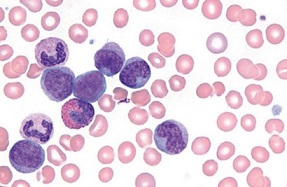U.S. Study Finds That Monocyte Anisocytosis Corresponds With Increasing Severity Of COVID-19 In Children
COVID-19 News - Pediatrics - Monocyte Anisocytosis Jun 23, 2023 2 years, 6 months, 3 weeks, 3 days, 23 hours, 35 minutes ago
Monocyte Anisocytosis Can Be Used As A Biomarker For COVID-19 Severity In Children
COVID-19 News: A new study conducted by a consortium of renowned medical institutions in the United States has discovered a significant correlation between monocyte anisocytosis and the severity of COVID-19 in children. Led by Massachusetts General Hospital, Harvard Medical School, and other esteemed healthcare centers, the research aimed to identify reliable biomarkers that could assess the risk of progression to severe disease in pediatric patients.
 Children and COVID-19 Severity
Children and COVID-19 Severity
Throughout the COVID-19 pandemic, it has been widely claimed by misleading
COVID-19 News reports featuring dubious ‘experts’ that children experience milder symptoms and lower rates of hospitalization and mortality compared to adults. However, it is crucial to note that severe cases among children are occurring at a rather similar rate as with adults. In fact, COVID-19 became a leading cause of pediatric death during the height of the pandemic, surpassing even influenza.
The Need for Biomarkers in Pediatric COVID-19
Given the potential severity of the disease in children and the lack of established biomarkers for assessing COVID-19 severity in this population, the study set out to address this critical knowledge gap. While risk assessment tools for determining COVID-19 severity have primarily focused on adults, this research aimed to identify effective markers specifically tailored to pediatric patients.
Monocyte Anisocytosis as a Key Indicator
Monocytes, a type of white blood cell, play a crucial role in distinguishing disease severity in SARS-CoV-2 infections. However, capturing monocytic activation accurately has proven challenging. The study explored the concept of monocyte anisocytosis, which refers to variations in the sizes of blood cells, as a potential marker of COVID-19 severity in children.
Retrospective Multicenter Study
The study team conducted a comprehensive multicenter retrospective study involving 215 children with SARS-CoV-2 infection, including cases of Multisystem Inflammatory Syndrome in Children (MIS-C), convalescent COVID-19, and healthy age-matched controls. By quantifying monocyte anisocytosis using the monocyte distribution width (MDW) from complete blood counts, they sought to determine whether this parameter corresponded with increasing disease severity.
Findings and Clinical Implications
The study's results revealed a clear association between monocyte anisocytosis and the severity of COVID-19 in children, with higher MDW values indicative of more severe disease requiring hospitalization. Moreover, the MDW marker outperformed other inflammatory markers commonly used in adults, such as lymphocyte count, neutrophil/lymphocyte ratio, C-reactive protein, and cytokines, in identifying severe disease in pediatric patients.
Significance of Monocyte Anisocytosis
Monocyte anisocy
tosis not only aligned with shifting hematologic profiles and inflammatory markers in children with COVID-19 but also served as a clinically accessible biomarker for severe disease. Although MDW should be evaluated in combination with clinical presentation and other inflammatory markers, its identification of an exaggerated innate immune response in severe pediatric cases provides valuable insights into the inflammatory response to SARS-CoV-2 infection.
Implications for Future Outbreaks
The development of biomarkers that aid in the early recognition of severe COVID-19 in children is of utmost importance, especially in the context of future endemic or pandemic outbreaks. Monocyte anisocytosis, as demonstrated by this study, offers a promising avenue for identifying high-risk patients, providing an opportunity for timely interventions and improved outcomes.
Conclusion
This study conducted across multiple leading medical institutions in the United States sheds light on the correlation between monocyte anisocytosis and the severity of COVID-19 in children. By quantifying monocyte distribution width (MDW), researchers discovered that MDW serves as a clinically accessible biomarker for severe disease in pediatric patients. These findings have significant implications for identifying at-risk children and improving our ability to manage severe cases in the future.
The study findings were published in the peer reviewed journal: Frontiers In pediatrics.
https://www.frontiersin.org/articles/10.3389/fped.2023.1177048/full
For the latest
COVID-19 News, keep on logging to Thailand Medical News.
